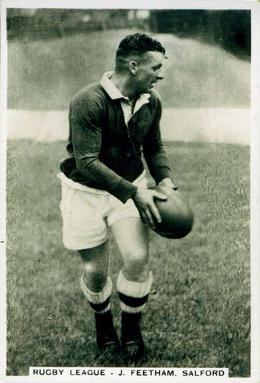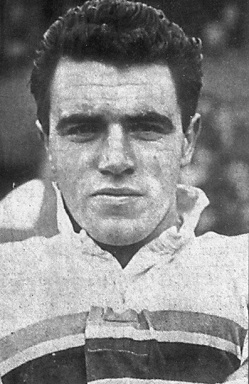Hubert Charles Day was a rugby hooker who played rugby union for Newport and rugby league for Salford. He was awarded five caps for Wales under union rules and was part of the Welsh side that won the 1931 Five Nations Championship. At Salford Day forged a reputation as the greatest hooker to play for the club, his record 488 appearances for the club went unbroken for over 35 years.
Harold Paul Charlton is an English former professional rugby league footballer who played in the 1960s, 1970s and 1980s, and coached in the 1970s, 1980s and 1990s. He played at representative level for Great Britain, England, Cumberland and Cumbria, and at club level for Kells ARLFC, Workington Town, Salford and Blackpool Borough, as a fullback, and coached at club level for Workington Town. He was part of the Great Britain squad which won the 1972 World Cup.
Kevin Ashcroft is a former professional rugby league footballer who played in the 1960s and 1970s, and coached in the 1970s, 1980s and 1990s. He played at representative level for Great Britain and Lancashire, and at club level for the Rochdale Hornets, Dewsbury, Leigh, Warrington and Salford, as a hooker. and coached at club level for Leigh and Salford. Ashcroft is a Warrington Hall of Fame inductee.

John "Jack" Feetham was an English professional rugby league footballer who played in the 1920s, 1930s and 1940s. He played at representative level for Great Britain and England, and at club level for Hull Kingston Rovers, and Salford, as a prop, or loose forward, i.e. number 8 or 10, or 13, during the era of contested scrums.

Bernard "Barney" Hudson was an English rugby union, and professional rugby league footballer who played in the 1920s, 1930s and 1940s. He played club level rugby union (RU) for Horden Rugby Football Club and Hartlepool Rovers, and representative level rugby league (RL) for Great Britain and England, and at club level for Salford, as a wing, i.e. number 2 or 5. Whilst serving in the Royal Air Force during the Second World War, he was a guest player, and captained Dewsbury.

Emlyn Jenkins was a Welsh cinema manager, trainee teacher, landlord of a public house, rugby union, and professional rugby league footballer who played in the 1930s and 1940s, and coached rugby league in the 1950s. He played club level rugby union (RU) for Treorchy RFC, and Cardiff RFC, and representative level rugby league (RL) for Great Britain, Wales and England, and at club level for Salford, Wigan and St. Helens, Leigh, as a fullback, wing, centre, stand-off, or scrum-half, i.e. number 1, 2 or 5, 3 or 4, 6, or 7, and coached club level rugby league (RL) for Leigh and St. Helens.

William Dingsdale was an English professional rugby league footballer who played in the 1920s, 1930s and 1940s. He played at representative level for Great Britain, England and Lancashire, and at club level for Broughton Rangers and Warrington, as a centre, i.e. number 3 or 4.
Robert "Bobby" J. Greenough is an English World Cup winning former professional rugby league footballer who played in the 1950s and 1960s. He played at representative level for Great Britain and Lancashire, and at club level for Blackbrook A.R.L.F.C., and Warrington, as a wing, or stand-off, i.e. number 2 or 5, or 6.

Harold Palin, also known by the nickname of "Moggy", was an English professional rugby league footballer who played in the 1930s, 1940s and 1950s. He played at representative level for Great Britain and England, and at club level for Warrington (captain), Swinton, Halifax and Keighley (captain), as a goal-kicking fullback or loose forward, i.e. number 1, or 13, during the era of contested scrums. Harold Palin's nickname of 'Moggy' was given to him as a child due to cat-like abilities, however he was not particularly fond of the nickname.
Alan Spencer Edwards was a Welsh rugby union, and professional rugby league footballer who played in the 1930s and 1940s. He played club level rugby union (RU) for Aberavon RFC, the Royal Air Force, and representative level rugby league (RL) for Great Britain and Wales, and at club level for Salford, Leeds, Dewsbury, and Bradford Northern, as a wing
William Watkins was a Welsh rugby union, and professional rugby league footballer who played in the 1930s and 1940s. He played club level rugby union (RU) for Cross Keys RFC, and representative level rugby league (RL) for Great Britain and Wales, and at club level for Salford and wartime-guest at Oldham RLFC, as a scrum-half, i.e. number 7.

Lawrence "Laurie"/"Gilly" M. Gilfedder was an English rugby union and professional rugby league footballer who played in the 1950s and 1960s. He played club level rugby union (RU) for Warrington RUFC, and representative level rugby league (RL) for Great Britain and Lancashire, and at club level for Warrington, Wigan, and Leigh, as a goal-kicking centre, second-row, or loose forward, i.e. number 3 or 4, 11 or 12, or 13, during the era of contested scrums.
Patrick Dalton was an English professional rugby league footballer who played in the 1930s and 1940s. He played at representative level for England, and English League XIII, and at club level for Salford, as a second-row, or loose forward, i.e. number 11, 12 or 13, during the era of contested scrums.
Christopher Brockbank was an English professional rugby league footballer who played in the 1920s, and coached in the 1930s through to the 1950s. He played at representative level for England, and at club level for Swinton and Bradford Northern, as a wing, i.e. number 2 or 5, and coached at club level for Huddersfield and Warrington.
Thomas "Tommy" Thompson, also known by the nickname of "Tubby", was an English professional rugby league footballer who played in the 1920s and 1930s. He played at representative level has played for England, and at club level for New Springs ARLFC, Warrington, Oldham and Leigh, as a goal-kicking wing, or centre, i.e. number 2 or 5, or, 3 or 4.

John Aubrey Casewell was a Welsh professional rugby league footballer who played in the 1920s and 1930s, and coached in the 1940s. He played at representative level for Wales, and at club level for Salford, Leeds, Halifax and Keighley, as a second-row, i.e. number 11 or 12, during the era of contested scrums, coached at club level for Featherstone Rovers and Hunslet Engine Company ARLFC, and he was the Secretary of the Leeds and District Rugby League.
Daniel McKeating was an English professional rugby league footballer who played in the 1930s and 1940s. He played at representative level for British Empire and Cumberland, and at club level for Whitehaven Recreation ARLFC, and Barrow, as a hooker, i.e. number 9, during the era of contested scrums.
Samuel Miller was an English professional rugby league footballer who played in the 1920s, 1930s and 1940s. He played at club level for Salford, as a centre, i.e. number 3 or 4.
Harold Osbaldestin was an English professional rugby league footballer who played in the 1920s and 1930s. He played at club level for Salford, as a fullback, i.e. number 1.
William Pattinson, also known as Billy Pattinson, is an English former professional rugby league footballer who played in the 1970s and 1980s. He played at representative level for the British Amateur Rugby League Association Great Britain Lions, England and Cumbria, and at club level for Broughton Moor ARLFC, Cockermouth ARLFC, and Workington Town, as a second-row or loose forward, i.e. number 11 or 12, or 13, during the era of contested scrums.







